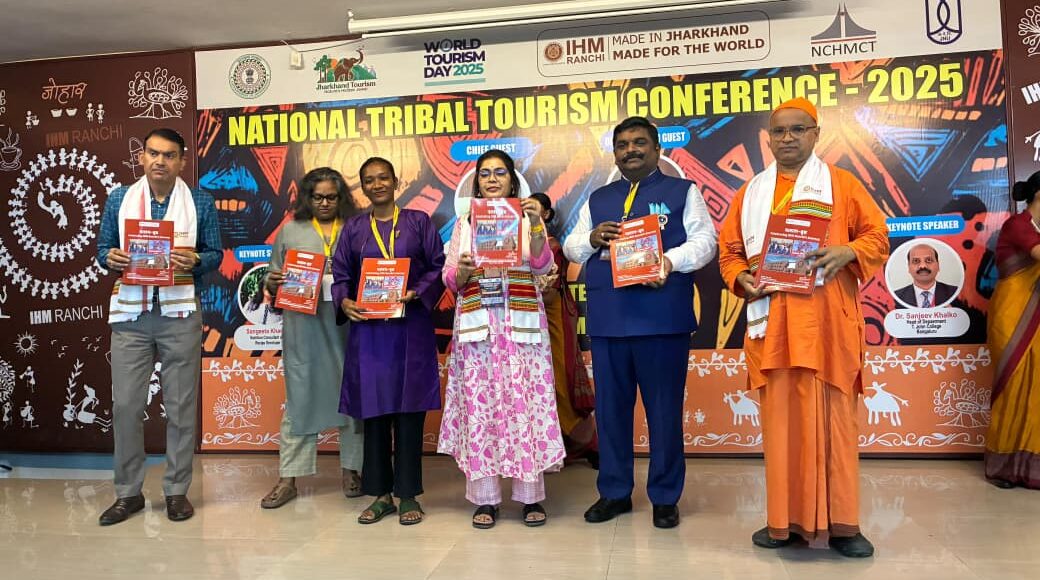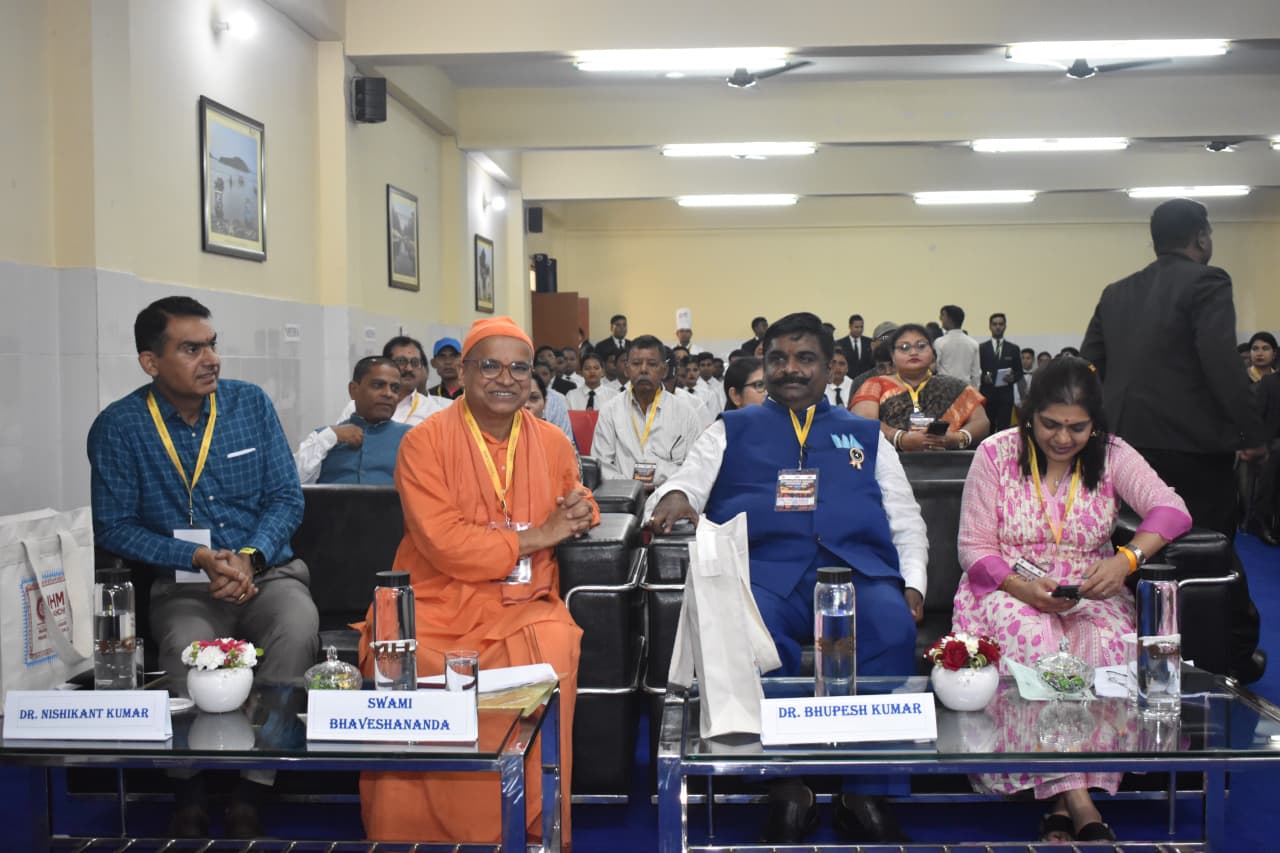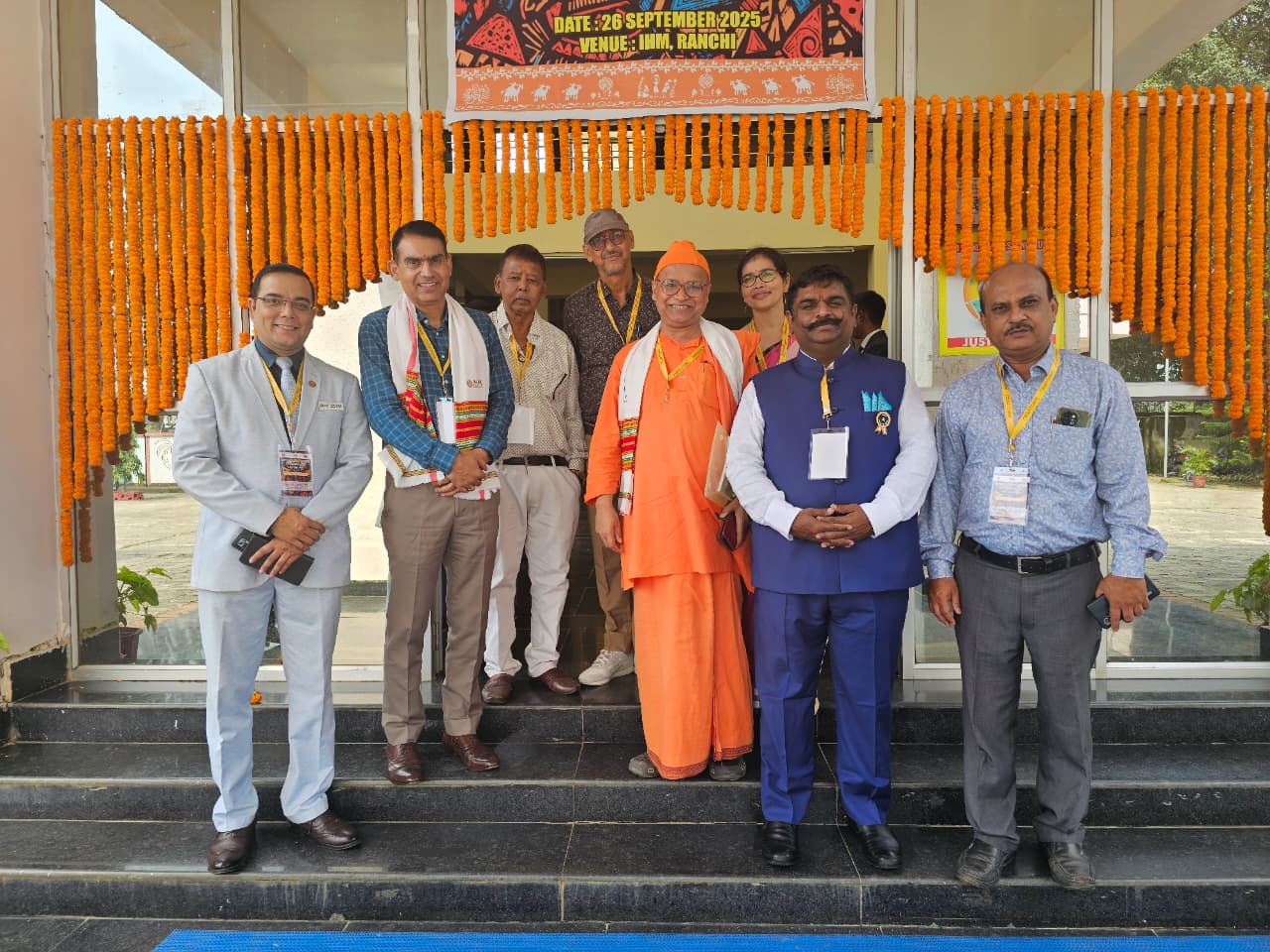Ranchi: Institute of Hotel Management (IHM), Ranchi, hosted the inaugural National Tribal Tourism Conference 2025 on September 26, 2025, on the theme “Globalising Tribal Heritage: Inclusive, Responsible and Sustainable Tourism.” The conference aimed to showcase indigenous tribal culture and cuisine, provide a platform for international and domestic stakeholders to exchange ideas and best practices for tribal development through responsible tourism, discuss sustainable tourism policies that empower tribal communities while preserving their cultural integrity, and position Jharkhand as a prominent destination on the global tourism map.
The event was graced by Ms. Vijaya Jadhav, Director of Tourism, Government of Jharkhand, as the Chief Guest; Swami Bhaveshanand, Secretary, Ramakrishna Mission Ashram, Morabadi, Ranchi, as the Distinguished Guest; and Dr. Bhupesh Kumar, Principal, IHM Ranchi, as the Presiding Officer. Faculty members, non-teaching staff, and students of the institute were also present.
Keynote speakers included Ms. Sangeeta Khanna, Culinary and Nutrition Consultant; Dr. Manisha Oraon, Co-founder and CEO, The Open Field, Jharkhand; Mr. Sanjeev Khalkho, Head of Department, Hotel Management, T. John College; and Dr. Nishikant Kumar, Associate Professor, BIT Mesra, Ranchi.
The conference commenced with the lighting of the ceremonial lamp by the Chief Guest and Distinguished Guest, followed by a devotional rendition of Ganesh Vandana by the students. This was succeeded by a mesmerizing Chhau dance performance by the State Manbhumi Chhau Dance Centre, Silli, Ranchi, which received widespread acclaim.
The institute also launched its inaugural annual magazine, Palash Vritt, along with the book Fundamentals of Marketing Skills.
Chief Guest, Ms. Vijay Jadhav, praised IHM Ranchi for organizing the Tribal Tourism Conference on the theme of “Globalizing Tribal Heritage” and appreciated the Chhau dance performance during Navratri. She stated that the conference’s theme is unique, reflecting the distinct identity of Jharkhand. She emphasized the need to effectively showcase tribal culture and heritage alongside tourism, highlighting the state’s art, culture, local cuisine, and unique tourism experiences. She also noted that while people from Jharkhand travel to other places, the state itself boasts numerous major tourist attractions, and we should recognize the immense tourism potential we possess. Furthermore, she highlighted the absence of gender inequality among the tribal communities in the state, where both men and women play a vital role in economic development.
She emphasized that sustainable development lessons can be learned from local tribal communities, citing traditions such as tying Rakhi on trees, the rich nutritional value of local cuisine, the medicinal properties of mahua, community-based homestays, dam-related festivals, and various other cultural practices. Regarding the association with IATO, she stated that tourism development is not the responsibility of one person, but of all citizens. Finally, she suggested that IHM Ranchi should organize this conference on a larger, global scale and consider what the global tribal community desires.
Distinguished Guest Swami Bhaveshanand praised IHM Ranchi for organising the event, reflecting on the importance of water, forests, and land. He elaborated on how homestays, local cuisine, tourism sites, and traditions are linked to economic growth, stressing the collective effort required for state development.
Dr. Bhupesh Kumar, Principal, IHM Ranchi extended his greetings to the dignitaries and attendees, expressed that the conference aims not only at academic discourse but also at promoting tribal culture and cuisine globally. He emphasised the importance of contributions from all stakeholders in presenting the state’s arts, culture, cuisine, and tourism on the world stage. Dr. Kumar highlighted Jharkhand’s potential for adventure tourism, describing tribal villages as micro-economies, and announced that the conference would be expanded to a global scale in the coming year. He underlined that the conference provides a platform for academicians, researchers, policymakers, and students to exchange experiences and explore the vast potential of tribal tourism in India.
Keynote presentations included Ms. Sangeeta Khanna on Jharkhand’s Environment and Tribal Culture: A Source of Inspiration for Sustainable Hospitality and Tourism, Dr. Manisha Oraon on From Forest to Plate: Establishing Jharkhand’s Tribal Cuisine as the Future of Sustainable Culinary Tourism, Dr. Nishikant Kumar on Roots, Routes, and Rewards: Reviving Tribal Tourism in Jharkhand as a Global Ethical Economy and Mr. Sanjeev Khalkho on Voices of the Forest, Tales of the Earth: Bridging Tribal Tourism and Cultural Heritage.
The conference also featured a technical session chaired by Dr. Nishikant Kumar (BIT Mesra, Ranchi), Dr. Manisha Oraon (The Open Field, Jharkhand), Dr. Ladli Rani (Assistant Professor, Ranchi University), and Dr. Pankaj Chatterjee (Assistant Registrar, RKDF University, Ranchi). Research papers were presented by participants including Mr. Ravi Kumar, Mr. Hare Krishna Chaudhary, Ms. Debanjana Sen, Mr. Naveen Gupta, Dr. Dilip Kumar Das, Dr. Sanjeev Khalkho, Mr. Himanshu Arya, Mr. Madhu Kumar, Mr. Sunil Kumar, Ms. Mahalakshmi R, Dr. P. Raja (PhD), Mr. Akash Banerjee, Dr. Ananya Mitra, Dr. Ajay Khattar, Mr. Arun Murugan E, Ms. Soumya Malviya, Dr. Lokeshwar Singh Jodhana, Mr. Ashish Sharma, Ms. Priya Sinha, Mr. Rahul Dev Singh, Mr. Ramanand Kumar Mishra, Ms. Shraddha Sharma, Dr. Manohar Sajanani, Dr. Prateek Ghosh, Ankit Baral, Ashutosh Pandey, Dr. Sadanandan Ariyaputhiri, Mr. Alok Kumar, Dr. Jaya Yadav, Dr. Anindita Bhardwaj, and Ms. Sanskriti Agrawal on diverse topics related to tribal tourism and cultural sustainability.



